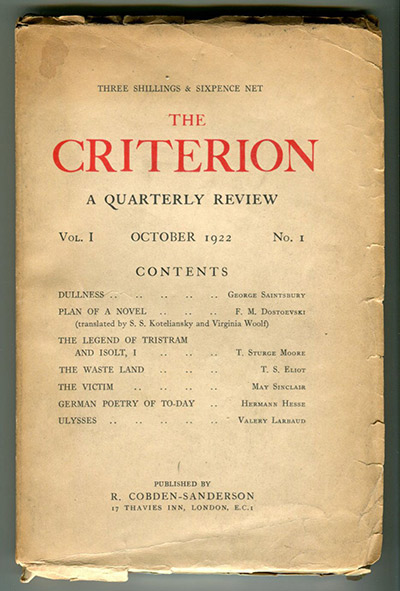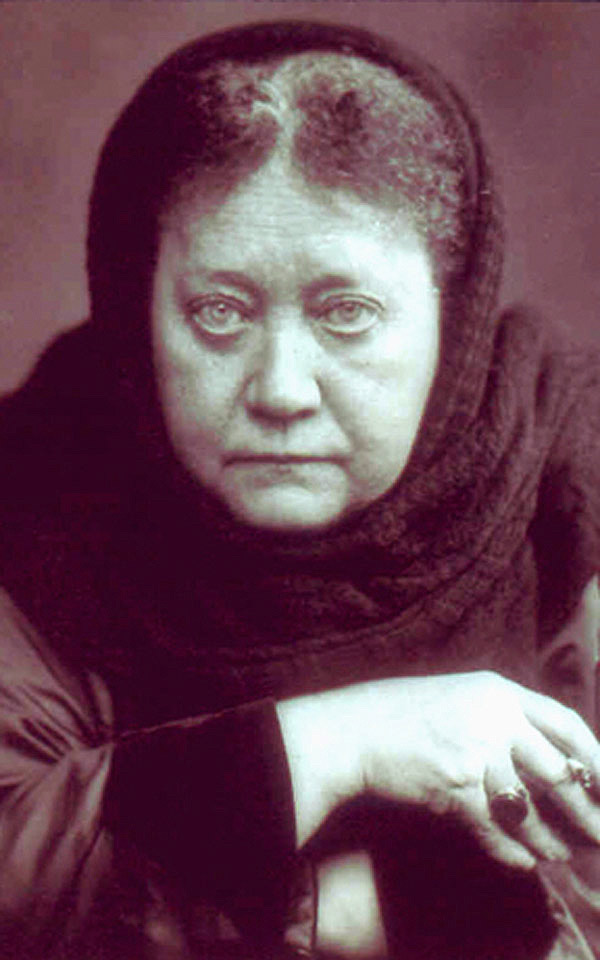wcag heading
Gamache took the bread to the long pine table, set for dinner, then returned to the living room. He reflected on T.S. Eliot and thought the poet had called April the cruelest month not because it killed flowers and buds on the trees, but because sometimes it didn’t. How difficult it was for those who didn’t bloom when all about was new life and hope. (The Cruelest Month, page 248, Trade Paperback Edition)
How serendipitous to offer this post up in the month of April when the novel itself is set and the month—by way of T.S. Eliot’s The Waste Land—that has provided one of the most recognizable lines in modernist poetry.
 Originally published in The Criterion in 1922, The Waste Land was conceived by Eliot during what has come to have been described as a nervous breakdown and was heavily influenced by many things, including the Grail Legend, the work of James Joyce, Homer, and Hermann Hesse. The poem defines the prevailing desperation of the post-World War I generation as well as Eliot’s own tortured time.
Originally published in The Criterion in 1922, The Waste Land was conceived by Eliot during what has come to have been described as a nervous breakdown and was heavily influenced by many things, including the Grail Legend, the work of James Joyce, Homer, and Hermann Hesse. The poem defines the prevailing desperation of the post-World War I generation as well as Eliot’s own tortured time.
Eliot described his epic poem as, “the relief of a personal and wholly insignificant grouse against life . . . just a piece of rhythmical grumbling.” Despite the poet’s own downplaying of his work, a vast number of significant critics disagreed with him. Conrad Aiken called it, “One of the most moving and original poems of our time” while Ezra Pound— who had a heavy hand in editing Eliot’s masterpiece—called it a “justification” of “our modern experiment”.
At its heart, The Waste Land is about rebirth—the revitalization of society after the catastrophes of war, the restoration of the mind after the ravages of mental illness, and the reinvigoration of the spirit after prolonged dejection.
 Louise, as always, has chosen the perfect title because at the very core of this magnificent novel is the notion of rebirth and as the Gamache quote (at the top of page)—and Eliot’s own “April is the cruelest month” line—so profoundly illustrate is that rebirth can be accompanied by astonishing pain, even death.
Louise, as always, has chosen the perfect title because at the very core of this magnificent novel is the notion of rebirth and as the Gamache quote (at the top of page)—and Eliot’s own “April is the cruelest month” line—so profoundly illustrate is that rebirth can be accompanied by astonishing pain, even death.
We witness this throughout the book from the reoccurring theme of Easter (the death and rebirth of Christ), the rebirth of flora and fauna when winter turns to spring, Ruth and the ducklings Rosa and Lillium, to the séance itself (the living communicating with the dead).
In closing, I can’t help but point out one of the great “wink and nods” from the novel that concretely connects T.S. Eliot to Louise’s tome and that is Jeanne Chauvet using the nom de plume “Madame Blavatsky”.
The real Blavatsky, an infamous occultist of the late 19th Century, was heavily referenced in Eliot’s 1919 poem, The Cooking Egg:
Madame Blavatsky will instruct me
And, like Blavatsky, Chauvet offers her own guidance throughout The Cruelest Month.


45 replies on “CULTURAL INSPIRATIONS FROM THREE PINES: THE CRUELEST MONTH”
I am just starting The Cruelest Month
So excited to connect with the origin
.it seems I get a lot more recent reading your novels. Thanks you much .waiting with anticipation for
Your next novel.j
I love the cultural inspirations themes. They are genuinely interesting and have enriched my understanding of the books, which I am now eager to re-read. Bravo, Dr Hochman.
Much appreciated, Mary!
The reference to Madame Blavatsky cracked me up when I first read the book. So many large and small interweavings of great psychological and moral depth in these tales. I’m just about to embark on my third run through the whole set (in order, of course — I tell new readers, which I am always trying to recruit, that in this set of books, the order matters). Look forward to new insights each time.
That’s the joy of reading Louise Penny! Your inner..tuition has to awake and listening..or you’ll miss one of her hidden gems.. and rereading her novels helps as well! One always discovers something new.
“inner tuition” LOL, as I do often while reading Ms. Penny’s Prose. Well stated!
Great use of allusion. Makes the text more dense and dramatic. Impossible to know if Eliot had Chaucer in his mind when he was writing “The Wasteland.” Both of them are in my brain when I read Gamache. (Literature professor.)
I read The Cruelest Month several weeks ago and loved it. I am trying to catch up in this wonderful series. I know when I start each one there will be a feast for the mind. Not only is the story wonderful, but the literary quality is top notch. Keep on writing and crafting such great literature and there will be many years of reading pleasure for your readers. You elevate the genre that more writers should learn from.
TS Eliot, letter to Natalie Clifford Barney, 11th May 1923: “April is indeed the cruellest month, and the fact follows the word.”
Note however that in all cases, especially the poem as published, Eliot employs the English spelling of the word, with two ls. He may have been born in the US, but he wrote in English. It is incorrect to quote “April is the cruelest month”.
As an English major in my undergraduate life, I find these explorations take me back to “old friends,” long forgotten. Professor Paul– and most especially, Louise — thank you for new classes, all the more appreciated for reawakening my affection.
You’re welcome, Allison!
It is such an apt quote!
Gamache requires two readings for me; the first because I am so caught up in the story and its conclusion, and th second for the sheer poetry and imagery!
I read the book, then later I listen to it. There is so much in each book.
Only two?
Think I’m on my fourth!!
Same here, Elania Mavromatis – – I have just finished reading the entire series for the second time, and since it will be months yet before the new book is released, I may just start again!
Me too, Linda.
I get caught up in the mystery and read the books too fast the first time. Then I read it again for the poetry of her words. Then…. I listen to the audio and get even more. Then…. I reread them with even more thought and pleasure. Amazing works of art!
Louise Penny’s novels stand out from the rest in part because of her excellent ear for the right phrase. She is clearly well-read herself.
I recall how perplexed I once was when my dear husband’s mother and grandmother pronounced May a sad month – I always rejoiced at the scent of moist earth and lilacs, signaling our survival of yet another winter. But I get it now, very personally, as I mark the year passing since the death of my mother. I’ve never been one to dwell on deaths, but rather focus upon births and lives well-spent. April is indeed a cruel month for me, in that Death crept so slowly to draw my mom to her Eternal Peace – nearly half its days – and in the short weeks that followed, truths most cutting and painfilled were revealed that cheated me of the luxury of what I had anticipated as for grief. It’s taken the year to pray and reflect upon the good of that life for me to arrive, well, perhaps the better word is progress towards my own peace. It was after Mom’s passing that a college friend introduced me to Louise’s books, and I too am astounded at her wordcraft and sculpting of scenes and characters- I believe I will peruse these books again and again to savor the literary, scriptural and historical references just as that dear silly woman savored her soak in the dried-soup infused tub…my first real laugh of this year. A journal will help me draw lines of remembrance. Thank you, Louise.
I just finished re-reading this book last night (probably for the fourth time) and once again picked up on more people, places and things that re-appear in later titles. I don’t know how you can keep track of all the literary references and character relationships. I envision a giant whiteboard with colored shapes and arrows and hopefully a massive list of themes and ideas to include in future titles?
I am constantly amazed at the subtleties Penny is able to put into her work that turn into significant backdrop, giving a scene, a moment whole new meaning. Brilliant.
I didn’t recognize the cruelest month’s origin…but another great subtle and profound example of Louse Penny’s ability to install so much depth into her writing. I love it.